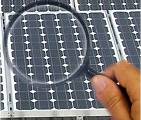A recent study by an Australian newspaper has criticised the Government’s solar panel rebate scheme, stating it is too expensive a form of carbon dioxide abatement. Others disagree.
A Sydney Morning Herald study claims government schemes designed to cut emissions by “direct spending or regulatory intervention” says they have cost an average of $168 for each tonne of carbon dioxide abated. The SMH singles out Labor’s solar panel rebate as one of the worst offenders, stating it cost $300 or more for every tonne of carbon abated.
CEO of national power solutions provider Energy Matters, Jeremy Rich, questions how the $300 per tonne figure was arrived at.
“A 1.5kW solar electric system, basically an entry level system, in New South Wales generates around 78 tonnes of carbon dioxide abatement over 25 years at a cost of $6200 in Solar Credits subsidies. This means the cost of carbon abatement is approx. $80 per tonne. When you take into account a rooftop solar panel array will likely produce a similar benefit for years beyond that time frame, it drives the cost even lower. Additionally, with the rebate being reduced in a few months, it will become even cheaper in terms of subsidisation.”
According to Energy Matters co-founder Max Sylvester, other points may not have been included in the study that would alter the picture dramatically.
“I haven’t seen the full methodology used in the study, but it’s a big undertaking to really define the true cost and value of solar panels, one requiring specialist knowledge and long term view. Certain facts and issues were perhaps not readily available or considered by the parties who performed the study.”
“For example, and we keep having to raise this point, billions have been spent on subsidies for the long established fossil fuel industry. These heavily polluting industries are continuing to be subsidised which has an effect of keeping the price of solar higher than it could be and distorting the true cost of fossil fuel based power generation. Some methods of carbon abatement are a poorly applied band-aid that allow fossil fuel related damage to continue to fester. Solar is part of a real cure.”
Australia isn’t the only country still giving fossil fuel a substantial helping hand and helping to perpetuate environmental problems in doing so. U.S President Obama recently acknowledged the issue of fossil fuel subsidisation in his State of the Union speech, stating ” I don’t know if you’ve noticed, but they’re doing just fine on their own. So instead of subsidizing yesterday’s energy, let’s invest in tomorrow’s.”
Mr. Sylvester says it should be remembered that solar and other clean, renewable technologies are being implemented to help combat the disastrous effects of society’s fossil fuel addiction. The cleanup effort given the scale of the problems isn’t cheap; but likely much cheaper than the damage that’s been done, is being done and will continue to be done if the current status quo remains.
“Here’s an example of the true cost of coal, from a recently released study originating from Harvard University. Professor Dr. Paul Epstein, associate director of the Harvard Center for Health and the Global Environment, states that when all the negative effects of coal are taken into account throughout its life cycle, the final bill to the USA economy each year is a third to over half a trillion dollars dollars a year. That is a mind-boggling amount of money. Given Australia is still so reliant on coal, I’m assuming the costs would be proportionately around the same.”
“Additionally, the SMH study did not appear to take into consideration the value of the energy produced by rooftop solar. When you burn coal, you burn it once and its gone. Solar panels on the other hand keep generating clean electricity for decades.”
Mr. Sylvester believes these issues are only the tip of the iceberg when it comes to the benefits of solar power and even in the face of the competition from subsidised fossil fuels, solar continues to decrease in cost, thanks in part to solar panel rebates.
“There’s also the added benefits associated with having a decentralised energy generation infrastructure, the tendency for people to become more energy efficient and energy aware when they have installed a system, plus green job creation. The list goes on and on – and all of these things contribute to the real value of rooftop solar power and in turn, decreases its true cost.”












































